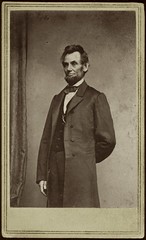The world Steven Spielberg creates in Lincoln (2012) truly does not seem far removed from the one in which no one saw slavery as a moral issue: the world of colonial America, for example. It’s the nineteenth century, however, and President Lincoln insists on the passage of the slavery-extirpating 13th Amendment—the subject of Spielberg’s and screenwriter Tony Kushner’s film.
I don’t care for the director’s sentimental hyperbole, but Lincoln is a quite good historical drama (however much license it takes). Though the theme lacks profundity, the writing is intelligent, and by saying this, I am obliged to point out what the theme is: that dishonest actions are sometimes needed for producing perfectly just and noble political ends. Nothing profound, or original, about that; although fortunately there is much more going on in the picture than this element.
The talk is clever, the debate exciting. Costumes, production design and Janusz Kaminski’s cinematography are remarkable and captivating. Kushner is a homosexual, but Abe Lincoln here is not gay. Not openly, anyway, and probably not at all. Period.
Daniel Day-Lewis plays him appealingly, although other actors, such as Sally Field and the poised David Strathairn are more memorable. Outstanding.
Lincoln is no John Adams, but it is one of Spielberg’s best films.




